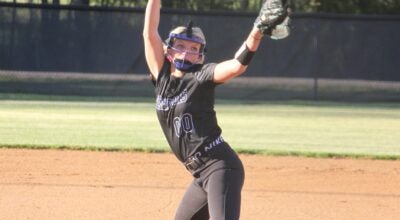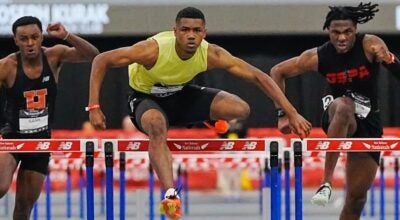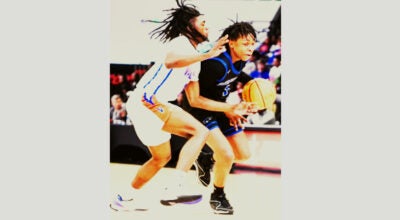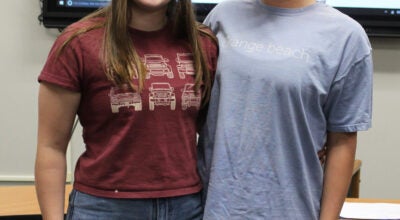An outing to remember
Published 10:54 pm Friday, August 1, 2008
DEMOPOLIS — The notes I wrote to myself ended early. The last one was written at 7:31 a.m., five hours before the boat returned to Demopolis City Landing.
The intention had been to take extensive notes and ultimately produce an in-depth piece on my experiences and education during this rare outing. Those designs changed soon after the boat began its way up the Tombigbee River.
I met Boyd Duckett at the city landing at 5:30 a.m., a full eight hours earlier than I generally report to the office. Sports guys are night shift people. We come in late and leave early in the morning. It’s part of the job. But adapting to opportunity is also part of the job. So even though I knew I would be far from my best, a pre-dawn rendezvous was very little to ask given that my first fishing trip in approximately two decades was about to be spent with the 2007 Bassmaster Classic champion. Quite simply, I was about to get a lesson in bass fishing from one of the best in the business.
In the weeks leading up to the occasion, I was unusually nervous. I didn’t grow up in a river town like Demopolis. I had never been aboard any vessel other than a canoe. And worst of all, I am the product of a family chocked full of non-swimmers. That last statement should in no way be taken lightly. I possess the aquatic skills of a cinder block, a fact that generally produces an abnormal anxiety whenever I am near the water.
Now, many would likely view my reservations as unfounded considering that fishing is meant to be done from a boat. However, my history of bad luck and comedic clumsiness more than merited hesitation on my part.
But I persevered, choosing to err on the side of a memorable experience rather than allowing trepidation to win the day. And there I found myself, on the back deck of Boyd’s boat, struggling to cast without tangling the wire.
When we first discussed the possibility of the outing, I told Boyd I knew nothing about fishing. I don’t think he fully grasped the entirety of that nothingness until we were actually on the water.
He began the day by filling me in on what goes into preparing for a tournament. He explained how Bassmaster competitors have two-and-a-half days to “piece the puzzle together,” before a tournament. He detailed how a fisherman feels out a lake in much the same way a golfer gets the feel of a course, seeking to determine what constitutes a good score for the particular event.
These are all analogies that made sense even to me, a rookie sports reporter whose fishing knowledge was previously limited to information gleaned while writing 300-word stories about the local tournaments at the city landing.
Once he had successfully placed the framework of the concept in my mind, Boyd began to provide in-depth insight into the processes involved in such work. He told me of how participants fish multiple spots in short periods of time, seeking to determine from where the bites are coming. Then, we got down to fishing.
My last note was scribbled at 7:31 a.m., when we changed from fast-moving baits to plastic worms. But it was when I put down my pen and trusty reporter’s notebook that the lesson truly began.
With all the grace of an untrained monkey, I fumbled with the line and the bait. I put my all into cast after cast that resulted in the bait remaining firmly anchored to the end of the pole.
So Boyd, as gracious and patient as he professional, showed me yet again the basic steps of a cast. I think Boyd then believed he understood the fullness of my lack of fishing knowledge. But he would have been wrong.
So, after helping me discover what he termed as my “golf swing,” Boyd and I proceeded to fish.
He sought to test the waters for the Kiwanis Club tournament he was to fish in only a few days later. I sought to catch anything that would bite.
Over the course of the morning, he hauled in more than 40 fish, casting each back into the river and moving on to the next.
I, as an absolute contrast, received only three bites all afternoon. But on the third, at long last, I had one. I snatched the rod in an attempt to set the hook before managing to pull the fish all the way to surface before watching him swim away.
Dejected and somewhat amused, I knew the end result for me. I had put more into the water than I pulled out.
See, my absence of water savvy was far more encompassing than even I understood. Around the middle of the morning, we had grown weary of a bad spot and sped up river in search of more activity. Unaware of my surroundings and perhaps a little delirious from lack of sleep, I cocked my head slightly to the right.
Any thinking person would have surmised that air coming in at around 75 m.p.h. would change the direction of loose objects. Unfortunately, my eyeglasses just happened to be among those loose objects. And, much to my dismay, away they went, forever lost to the Tombigbee.
Later, still slow to learn under the conditions, my cap nearly suffered the same fate. But again, Boyd, in all of his patience was eager to help. He whipped the boat around and went back to retrieve it.
“You lose enough hats and glasses in the river, you’ll eventually learn,” he told me. I didn’t need my note pad to record that one. It should remain emblazoned on my consciousness for some time.
So I learned an appreciation for tournament fishing, found my “swing” and experienced firsthand the pitfalls of being completely oblivious while speeding down the river.
Yet, as much as these things tell of the events of the trip, they fail to encompass the whole of it. I pulled nothing out of the river that day. But I did come back with a pretty significant haul.
Over the course of the morning, fishing became less the focal point and more the backdrop of the excursion. Conversation became less about lures and more about life. I found myself as a young man of still minimal life experience, latching onto the words of a man who had found success and celebrity through his field but yet remained humble and unassuming. I realized as he effortlessly demonstrated the flipping technique, which produced eight bites in less than 30 minutes, that I was spending the morning with one of those rare individuals who is in and of himself so simplistically fascinating and engaging that he makes nearly everything with which he is involved seem equally as interesting. From that moment forward, I savored every piece of information I could get as I asked question after question. But it was no longer knowledge about fishing I sought. And, for a brief time, I no longer felt like a reporter. I became a student. I asked Boyd about his experiences in both his business and in fishing. I listened as he spoke plainly about his life, of how he came to Demopolis and how he reached the pinnacle of his sport. He uttered not one word with the expectation that it was somehow meaningful. But, whether intended or otherwise, each was.
And there it sat before me, my catch. It was the reason for getting up at 5 a.m. It was the story within the story. On this particular trip, I, the reporter, was more than a detached historian documenting events. I was part of the story. While many other writers over the coming years will tell of the successes of Boyd Duckett, none will ever record the manner in which he helped a bumbling, water-fearing, nocturnal rookie reporter find his swing.





